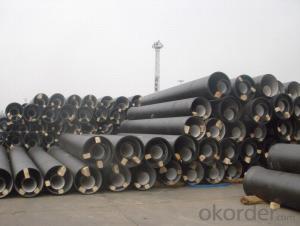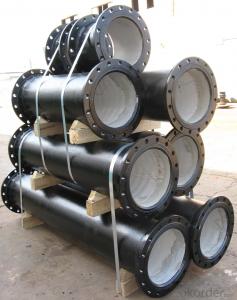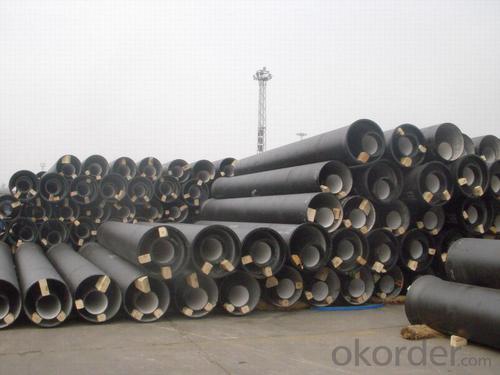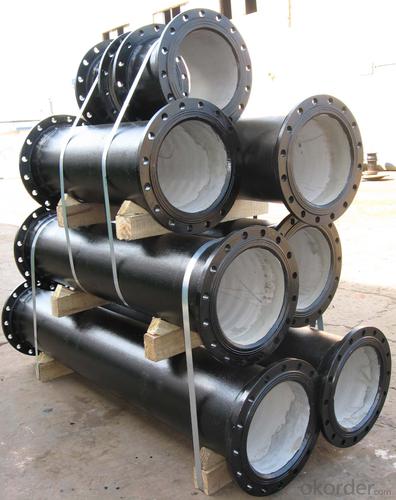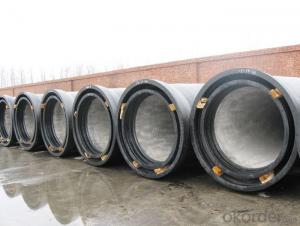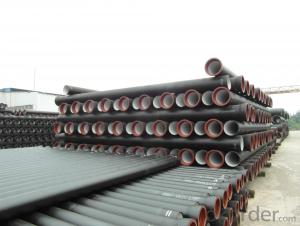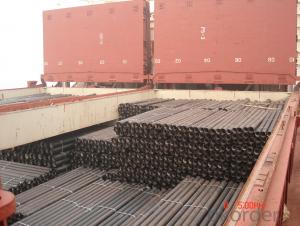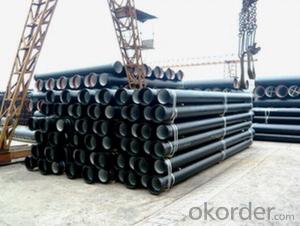Ductile Iron Pipe ISO2531 C CLASS DN1600
- Loading Port:
- China main port
- Payment Terms:
- TT or LC
- Min Order Qty:
- 20 m.t.
- Supply Capability:
- 200000 m.t./month
OKorder Service Pledge
OKorder Financial Service
You Might Also Like
1.Ductile Iron Pipe Description :
1) Pipes confirm to ISO2531,K9 class,T type joint,6m long,with inside cements lining conform to ISO4179,outside Zincspraying(130g/m2) and bitumen coating(70μm) conform to ISO8179
2) Pipe ends: Spigot and socket ends, with 100% SBR rubber gaskets accoding to ISO4633
DI pipe fittings are manufactured according to ISO 2531 or BS EN545 or BS4772 FOR POTABLE WATER ,internal is cement lining or wet epoxy coating;External is zinc plus bitumen or wet epoxy coating.
2.Main Features of the Ductile Iron Pipe:
Trustworthy financial strength.
One-stop shopping.
Fast and efficient service.
Coordination of shipments from multiple plants.
Specialists of the overseas shipping process.
A more competitive price.
3.Ductile Iron Pipe Images:
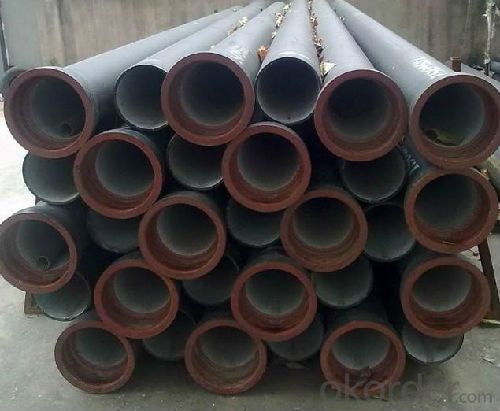
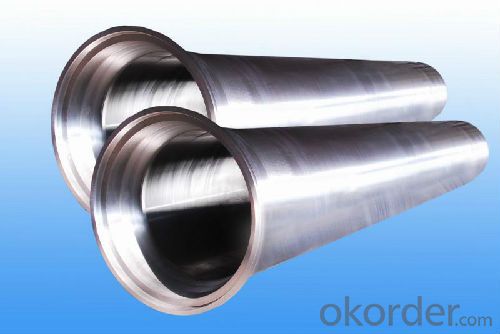
4.Ductile Iron Pipe Specification:
Internal lining: ductile iron pipes shall have an internal cement mortar lining in acc with ISO4179.
External coating: ductile iron pipes shall be externally coated with metallic zinc spray plus a further layer of resin
painting to ISO8179.
Gasket:100% SBR/NBR/EPDM rubber gasket in accordance with ISO4633.
Packing:ductile iron pipes from DN100 to DN300 be bundled with steel belts, others are in bulk.
Payment term: L/C, T/T.
5.FAQ:
We have organized several common questions for our clients,may help you sincerely:
1.Q: Why would you choose ductile iron pipe rather than other pipe materials?
A:The reasons are obvious for that not only ductile iron pipe possesses the inherent strength and flexibility of ductile
iron, combined with proven corrosion protection systems, but also the cost savings can be achieved from design to
installation and commissioning.
2.Q:Why can you guarantee the inner of pipes can’t be corroded?
A: High alumina cement mortar lining and sulphate-resistant cement mortar lining. These two special linings are applicable
to inner anti-corrosion for sewage pipes, improving resistance to erosion of the sewage components.
- Q: What are the different methods for joining ductile iron pipe?
- There are several methods for joining ductile iron pipe, each with its own advantages and limitations. One common method is mechanical joint (MJ) coupling, which involves using a rubber gasket and a set of bolts and nuts to create a watertight seal between pipe sections. This method is relatively quick and easy to install, but it requires a skilled technician to ensure proper alignment and bolt tightening to prevent leakage. Another method is flanged joint, where the pipe ends are equipped with flanges that are bolted together using gaskets to create a tight seal. This method allows for easy disassembly and reassembly of pipe sections, making it suitable for applications that require frequent maintenance or modifications. However, it is more expensive and time-consuming compared to other methods. One widely used method is push-on joint (POJ), which involves using a rubber gasket and a special lubricant to slide the pipe ends together. This method provides a reliable and watertight seal, and it is relatively quick and easy to install. However, it requires proper alignment and care to avoid damaging the gasket during assembly. Another option is restrained joint (RJ), which uses a mechanical joint coupling with additional features to resist axial forces or thrusts. This method is commonly used in applications where the pipe is subject to internal pressure, external loads, or seismic activity. It provides a secure and rigid connection but may require specialized tools and training for installation. Finally, welding is another method for joining ductile iron pipe. It involves heating the pipe ends and melting a filler metal to create a permanent bond. This method provides a strong and durable connection, but it requires skilled welders and additional time for preparation, welding, and cooling. Welding is often used for specific applications, such as joining sections of pipe with different diameters or connecting to other materials. In summary, the different methods for joining ductile iron pipe include mechanical joint coupling, flanged joint, push-on joint, restrained joint, and welding. The choice of method depends on factors such as the application requirements, installation time, maintenance needs, and budget.
- Q: How do ductile iron pipes handle traffic vibrations?
- Ductile iron pipes possess exceptional strength and durability, making them highly effective in managing traffic vibrations. Their inherent properties enable them to withstand fractures or cracks caused by external forces, such as vibrations induced by traffic. The pipes' remarkable tensile strength and elasticity allow them to absorb and dissipate the energy produced by traffic vibrations. This capability minimizes the impact on the pipes and prevents significant damage or failure. Moreover, the material's ductility enables it to deform slightly under stress without breaking, further enhancing its ability to endure vibrations. Additionally, ductile iron pipes exhibit superior resistance to corrosion and other forms of deterioration. This resistance guarantees the pipes' structural integrity over an extended period, even when subjected to repetitive vibrations caused by heavy traffic. In conclusion, ductile iron pipes are well-suited to handle traffic vibrations due to their robust nature, capacity to absorb energy, and resistance to corrosion. These characteristics establish them as a dependable choice for underground infrastructure in areas with high traffic volumes, ensuring a pipeline system that is durable and efficient in the long run.
- Q: Can ductile iron pipes be used for seawater intake systems?
- Yes, ductile iron pipes can be used for seawater intake systems. Ductile iron has excellent corrosion resistance properties, making it suitable for use in seawater environments. Additionally, ductile iron pipes are known for their strength and durability, which makes them ideal for handling the high pressures and harsh conditions associated with seawater intake systems.
- Q: Steel plastic pipe, ductile iron pipe, steel pipe difference
- The steel plastic pipe, the outer layer is made of steel, the inner cover of organic material, not easy to transport corrosive medium, suitable for delivery of utilities, tap water and toxic corrosive medium, not suitable for high temperature medium, pipe price is high, very difficult to install and manufacturers warranty period is generally 10 years.
- Q: Can ductile iron pipe be used for bridge crossings?
- Ductile iron pipe is suitable for bridge crossings due to its strength, durability, and flexibility. Its high tensile strength enables it to bear heavy loads and vibrations, making it ideal for supporting bridges and withstanding traffic weight. Moreover, the pipe's flexibility allows it to absorb movements and deformations caused by temperature changes, settling, and other factors, minimizing the risk of structural damage and ensuring the bridge crossing's longevity. Additionally, the pipe's resistance to corrosion makes it a dependable choice for bridge crossings exposed to moisture, chemicals, and other corrosive elements. Overall, ductile iron pipe possesses properties that make it a reliable and appropriate material for bridge crossings.
- Q: How is ductile iron different from cast iron?
- Ductile iron is different from cast iron in terms of its composition and mechanical properties. While both are types of iron alloys, ductile iron contains small amounts of additional elements, such as carbon, silicon, and magnesium, which enhance its strength, ductility, and impact resistance. This makes ductile iron more flexible and less brittle compared to cast iron. Additionally, ductile iron has a higher tensile strength and can withstand higher pressure and stress, making it suitable for applications where cast iron may fail.
- Q: What is the minimum cover requirement for ductile iron pipes?
- The specific project or engineering design considerations typically determine the minimum cover requirement for ductile iron pipes. However, as a general rule, it is often recommended to have a minimum cover requirement of at least 2 feet (or 0.6 meters) from the top of the pipe to the finished ground surface. This recommendation helps protect the pipe from external loads, soil settlement, and potential damage during construction activities. Additionally, it contributes to the long-term structural integrity and durability of the ductile iron pipe system. It is crucial to consult local building codes, industry standards, and project specifications for accurate and up-to-date information on specific minimum cover requirements.
- Q: Why does the cast iron pipe always run off when testing?
- The pipeline is installed, straight section of each pipe will be added pier, concrete pipe, elbow, three links should also have concrete pier, specific installation method according to GB Atlas 03SS515, and the straight pipe to soil, pipeline interface will be exposed, easy to check.
- Q: What is the minimum operating temperature for ductile iron pipes?
- Ductile iron pipes typically have a minimum operating temperature of -40 degrees Celsius, showcasing its exceptional strength and ductility in cold conditions. This makes it a versatile option for various purposes, such as water and wastewater systems. Nevertheless, it is crucial to acknowledge that the specific minimum operating temperature may differ based on factors such as the grade of ductile iron employed and the requirements of the application. It is highly advisable to refer to the manufacturer's specifications and guidelines for the appropriate utilization and optimal performance of ductile iron pipes in cold temperatures.
- Q: Are ductile iron pipes resistant to frost heave?
- Ductile iron pipes are generally considered to be resistant to frost heave. Frost heave occurs when water in the ground freezes and causes the surrounding soil to expand and lift. Ductile iron pipes have high tensile strength and flexibility, which allows them to withstand the forces exerted by frost heave without cracking or breaking. Moreover, ductile iron pipes have a high resistance to impact and can handle significant external loads. This makes them particularly suitable for areas that experience freezing temperatures and potential frost heave. Additionally, the joints in ductile iron pipes are designed to provide a tight seal and prevent water infiltration, reducing the risk of freezing and subsequent frost heave. However, it is important to note that while ductile iron pipes are resistant to frost heave, they are not completely immune to it. Extreme temperature fluctuations, prolonged freezing conditions, or inadequate insulation can still pose a risk to the integrity of the pipes. Therefore, proper installation techniques, including appropriate bedding and backfilling materials, thermal insulation, and proper maintenance, are crucial to ensure the long-term performance and resistance of ductile iron pipes to frost heave.
Send your message to us
Ductile Iron Pipe ISO2531 C CLASS DN1600
- Loading Port:
- China main port
- Payment Terms:
- TT or LC
- Min Order Qty:
- 20 m.t.
- Supply Capability:
- 200000 m.t./month
OKorder Service Pledge
OKorder Financial Service
Similar products
Hot products
Hot Searches
Related keywords
